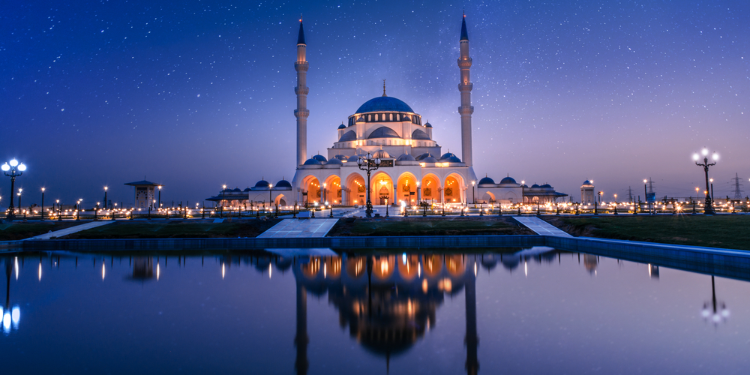
Considered the month of peace, serenity, sharing and good deeds, this year, Ramadan is starting on the night of Wednesday, March 22, or Thursday, March 23, depending on the countries where it is celebrated. The month of Ramadan is one of the pillars of Islam. Therefore, Muslim countries pay special attention to the rules surrounding this solemn period. So, what should expat in Muslim countries look out for during this important time of the Islamic calendar?
Particularities of the month of Ramadan
Ramadan imposes, for one month, a new life rhythm: there is the fasting from sunrise to sunset, the prayer time, and the meal at the end of the fast. This new rhythm impacts all spheres of life.
In Muslim countries, daily working time is reduced by 2 hours during the entire Ramadan period. This measure applies to all employees, Muslim or not, whether they observe Ramadan or not. Another thing: If you are driving, check out the paid parking hours, which are subject to changes during Ramadan.
Restaurants usually follow the fasting hours: they close during the day and open after the evening prayer. But each establishment is free to stay open or closed during the day. Some restaurants and cafes prepare take-out orders for customers (for the night's meal). In any case, it is better to book a table if you plan to dine out. Restaurant seating can be expensive during this particular period, and you will undoubtedly be one of many who want to dine out. However, international restaurants (French, Korean, Indian, etc.) often remain open.
Book your cab: Many taxi drivers will go home to break their fast and rest. Therefore, it is better to plan your trips, and have a plan B.
While restaurants and cafes may close during the day, shopping malls, supermarkets and grocery stores remain open all day. Some malls even stay open for late-night shopping.
Keep in mind that every Muslim country may have its own rules. So it's best to inquire with local authorities.
Dos for expats during Ramadan
Accepting gifts
The month of Ramadan is one of peace and serenity. These qualities are cultivated throughout the year but are especially highlighted during Ramadan. It is also the month of sharing and good deeds. Therefore, do not refuse any gifts you might be offered, whether you observe Ramadan or not.
Accepting an invitation to iftar
Iftar is the Ramadan meal taken by Muslims in the evening after sunset. You may be invited to share this meal as a sign of your host's consideration for you. Accept the invitation to avoid offending your host. Just enjoy the moment of sharing.
Don'ts for expats during Ramadan
Drinking, eating and smoking in public
During Ramadan, drinking, eating, or smoking in public is strictly prohibited in Muslim countries. Any drink or any food is forbidden, including chewing gum and candy. Meals and snacks are to be consumed only after sunset when breaking the fast, and this is not just a recommendation. Violating this rule is punishable by law. In the United Arab Emirates (UAE), you can be imprisoned for one month for breaking that rule. Under Article 313 of the UAE Penal Code, you also risk a fine of AED 2,000 (about $545). Penalties are applicable to anyone, regardless of whether you have a religion or not.
Aggressivity
Ramadan is the month of serenity and peace. Fasting and prayer are part of this solemn ambiance, and your behavior should also reflect the peaceful spirit surrounding Ramadan. Therefore, avoid any form of aggressivity, be it physical or verbal. Violent behavior is punishable by law, but we are talking here about arguments, conflicts and other virulent attitudes that can break out and go against serenity. Even if you are not observing Ramadan, avoid any outbursts out of respect for those who are. Do not be provocative or intimidating, let alone aggressive, abusive, or violent.
Being too handsy
Are you tactile? Well, during Ramadan, it's better if you keep it for your private moments at home. When in public, you should refrain from hugging and kissing. Discipline your body out of respect for others. Avoid any provocative or ambiguous attitude.
Playing loud music
It's said that music softens the mood. If you like music, that's totally fine. However, too loud music is neither good for human morals nor for your ears. If you are in a Muslim country during Ramadan, you can listen to your music with headphones without turning up the volume. This is a respectful move towards others, and it is also good for your ears. However, listening to or playing loud music is not allowed. Also, avoid dancing in public. If you are in a car, turn the music down for you and not up for the rest of the traffic.
Dressing inappropriately
One might want to debate what constitutes an appropriate outfit. Well, just avoid this debate during the month of Ramadan. Whether you are a man or a woman, make sure you are covered from the shoulders to the knees. Tourists or newly arrived expats can sometimes forget about proper dress code and would usually dress as they are used to. This is why it is crucial to seek information on traditions and culture in a Muslim country before you leave, especially if you're planning your move during the month of Ramadan. Out of respect for others and to avoid offending anyone, do not wear short, tight, or transparent clothing. Do not wear anything too extravagant or flashy, either. But these rules can vary from one Muslim country to another. In the United Arab Emirates, for example, it is recommended to cover up whether you are a man or a woman, whereas Malaysia appears to be more flexible towards non-Muslim women, who may dress as they wish. But just like sobriety in terms of dressing is required during Ramadan, sobriety in speech and behavior is also strongly suggested. Your serenity will be dressed with modesty, at least during Ramadan.
A month of respect, sobriety, sharing and peace
The rules of conduct to observe during Ramadan in a Muslim country are often based on respect for others and common sense. In any case, take the time to inform yourself if you plan to go to a Muslim country during this period so as not to commit any mistakes as soon as you get off the plane. If in doubt, ask the local authorities. Observe the locals and adapt in all simplicity.



















